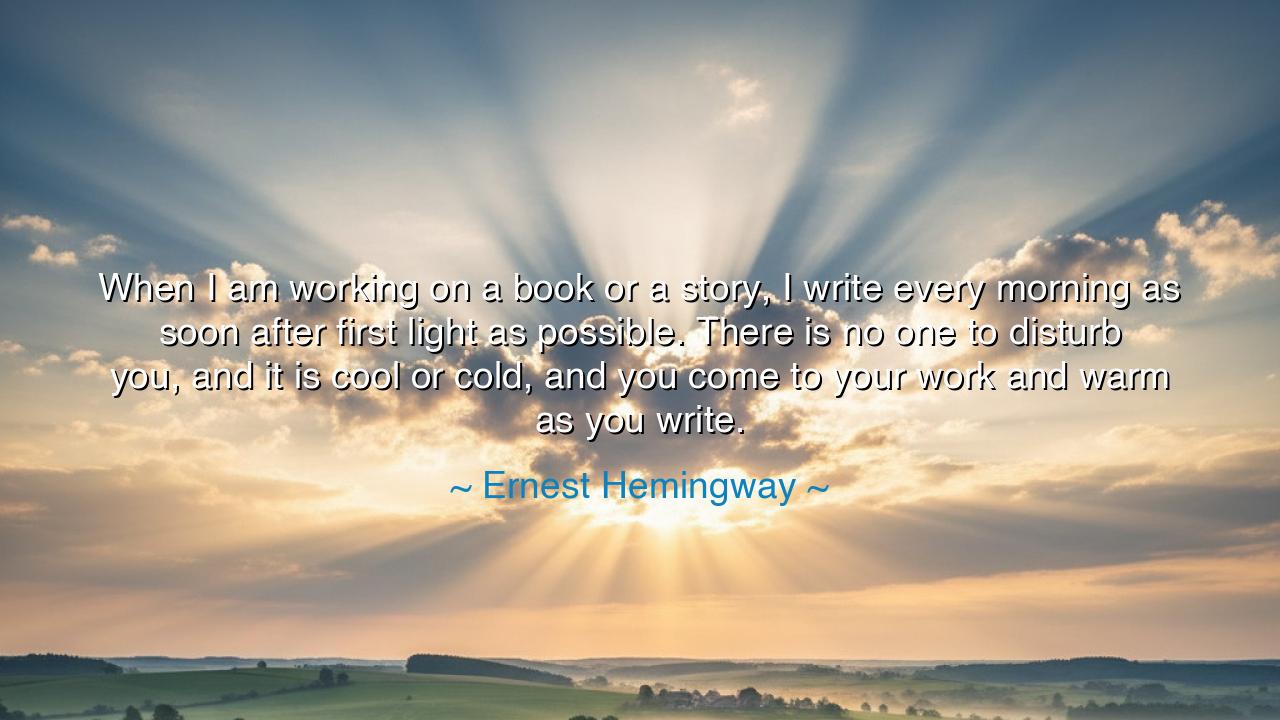
When I am working on a book or a story, I write every morning as
When I am working on a book or a story, I write every morning as soon after first light as possible. There is no one to disturb you, and it is cool or cold, and you come to your work and warm as you write.






In the sacred space of the early morning, when the world still slumbers beneath the veil of night, there lies a quiet, sacred moment for creation. Ernest Hemingway, a master of the written word, shares his timeless ritual when he writes, “When I am working on a book or a story, I write every morning as soon after first light as possible. There is no one to disturb you, and it is cool or cold, and you come to your work and warm as you write.” These words speak to the power of discipline, the solitude of creation, and the sacredness of the early hours—moments that have often been seen as a gateway to inspiration and deep focus. Hemingway’s morning practice is a call to rise with the dawn, to engage with the work of our hearts, undistracted and with purpose.
The ancients knew well the power of the early morning. In ancient Greece, the philosopher Plato began his day with reflection and contemplation, teaching that the mind is clearest in the early hours, before the distractions of the day take root. For Socrates, too, the early morning was a time of clarity—a period when his thoughts could flow unhindered by the noise of the world. The great minds of the past understood that in the quiet moments after first light, before the world wakes, there exists an inner sanctum where the mind can reflect, create, and connect to the deepest wells of wisdom. Hemingway, in his own way, follows in this ancient tradition, embracing the stillness of dawn to fuel his creative process.
Consider the monks of the Middle Ages, who arose before the sun to pray, meditate, and reflect. Their rituals, dedicated to the sacred work of the soul, mirrored the practices of the great thinkers who came before them. These early hours, free from distractions, were seen as a time when the connection to the divine and to one’s inner truth was most pure. The work of their hands—whether it be the copying of manuscripts or the creation of illuminated texts—was imbued with a kind of holiness, for they worked when the world was at rest, their minds free of the clutter of the day. In the same way, Hemingway’s early morning writing sessions serve as a kind of sacred labor, a time when the mind is clear and the work can flow freely, unburdened by the distractions of the outside world.
The act of writing, as Hemingway describes, is not simply a mechanical process; it is an invocation—a coming together of mind, body, and spirit. The coolness of the morning, the solitude, the absence of interruptions—all serve to prepare the writer for the task ahead. Hemingway’s words remind us that in creation, whether through the written word, the brushstroke, or any act of artistry, there is a ritual involved—a moment of discipline and dedication that precedes the work. It is not merely a matter of inspiration; it is about showing up, day after day, in the stillness, and allowing the work to unfold. This ritual of dedication to one’s craft is a powerful reminder of the spiritual nature of creation itself.
In Hemingway’s practice, there is an understanding of the energy that the early hours provide. The mind is sharp, the body is still, and the distractions of the world have not yet taken hold. In the same way, the warriors of ancient civilizations rose before dawn, prepared their minds, and set their intentions for the day. Alexander the Great, for instance, was known to rise early and practice his martial skills and leadership, setting the tone for the rest of his day. He understood that in the quiet moments of the morning, before the world came alive, he could align himself with the purpose of his mission. In this, there is a universal truth: the early hours are a time of preparation, where we can align ourselves with the greater purpose we wish to pursue.
The lesson in Hemingway’s practice is clear: to achieve greatness in any craft, we must cultivate the discipline of showing up, even when the world is still and our minds are untroubled by the day’s demands. The early morning is not just a time of rest, but a time of connection—to our work, to our deepest selves, and to the broader world of creation. Whether we are writers, artists, or warriors of our own paths, we must honor the quiet moments when our minds are clear, and the world around us is still. In those sacred hours, the seeds of our greatest work are planted, nurtured, and brought to life.
Let us then, in our own lives, embrace the power of the early hours. Rise with the first light of day, not just to face the world, but to connect with the work that calls to us. Discipline is the key, for in the stillness, we find the space to create—free from distractions, free from the noise. Like the great creators who came before us, let us use the early morning as a time to engage deeply with our craft, allowing it to unfold naturally, as the day rises around us. Through this, we honor the ancient wisdom that true greatness is not born from random inspiration, but from the daily dedication to the work we are called to do.






AAdministratorAdministrator
Welcome, honored guests. Please leave a comment, we will respond soon